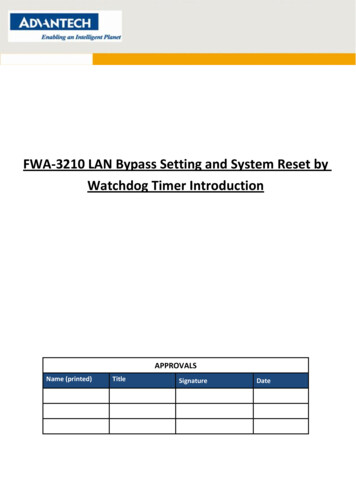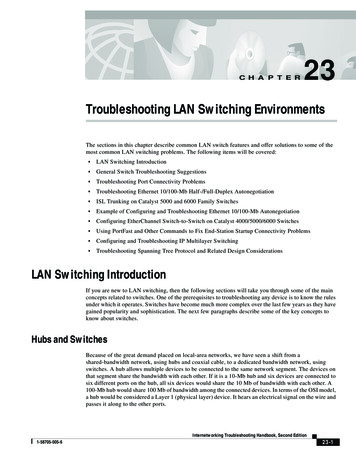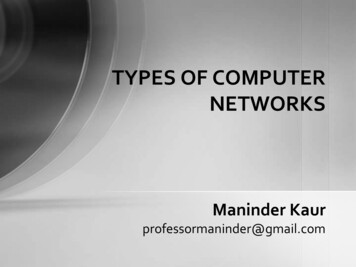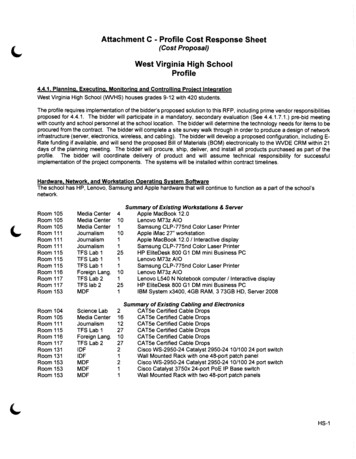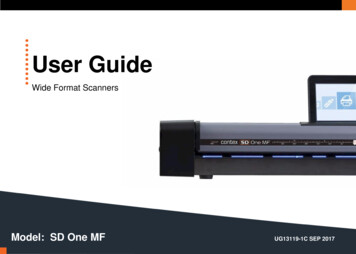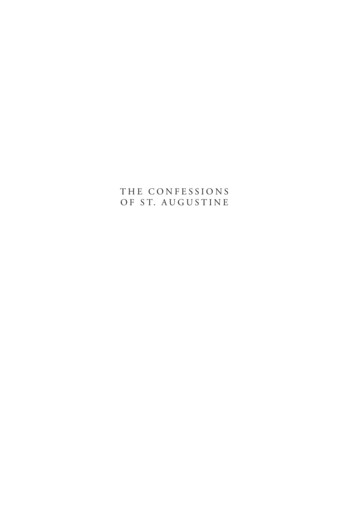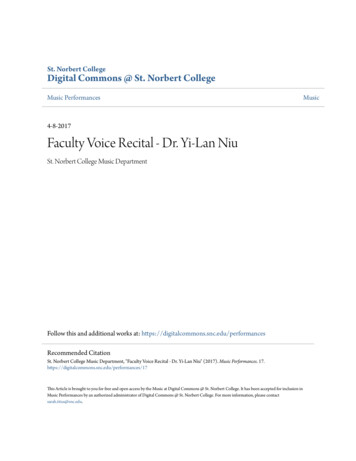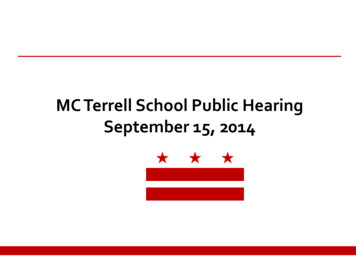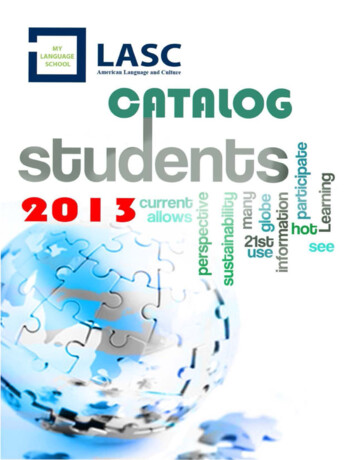
Transcription
LAN AGESCHOOLLA scAmerican Language and CultureC TAIOGQ).cenmQ.·-- CD C -f!co mmoC)c·c' :s c. mE C hot;.J.!; 21st; 'seeca use -e cm:::s"'·
Contents1TABLE OF CONTENTSINTRODUCTIONMission Statement. 3The History of LASC . 3Location . 3Ownership . 3FAQs . 4GENERAL INFORMATIONStaff and Faculty . 6Hours of Operation 7Holiday Calendar .8Academic Calendar .8Facilities . .8ADMISSION INFORMATIONAdmission Instructions for International Students 9Registration Procedures 9Immigration Definitions for Students .10How to Obtain F-1 Status.12Arrival at a U.S. Port of Entry.14Maintaining Lawful Student Status .16ACADEMIC POLICYGrading Method .18Graduation Requirements 18Termination of Candidacy 18Appeals Process .18Academic Probation Policy .18Attendance Policy .19Makeup Work .19Transcripts and Records .20Personal Conduct .20STUDENT SERVICESStudent Services 21Case Management Program 21Student Grievance .21Housing 22Basic Amenities . .22Banking in the United States . . .22Transportation . .24Grocery Guide . .25LASC (213) 384-3987 info@lascusa.com www.lascusa.com
Contents2FINANCIAL INFORMATIONStudent Fee Information. 26Cancellation, Withdrawal, and Refund Policy. 27School Closure. 28State of California Student Tuition Recovery Fund . 28PROGRAM INFORMATIONESL Core Program. 29TOEFL Test Preparation Program . 31Elective Core Program .32Concurrent Enrollment . . .35Private Tutoring . .35As a prospective student, you are encouraged to review thiscatalog prior to signing an enrollment agreement.LASC (213) 384-3987 info@lascusa.com www.lascusa.com
Introduction3Mission StatementThe mission of LASC is to provide quality English as a Second Language (ESL) programs to immigrantsand foreign students living in the Los Angeles and Orange County regions. The focus of our ESLinstruction is to cultivate students’ linguistic abilities for personal growth and development and academicstudies.Institutional Goals1. To enrich the knowledge of English for students seeking personal growth and development.2. To endow immigrants in the local community with the linguistic aptitude essential to better participate inAmerican society.3. To prepare students to succeed at the collegiate level.4. To provide our students with effective and passionate instructors.5. To provide a classroom environment with appropriate technology to facilitate teaching and learning.6. To partner with institutions of higher learning to provide our students with a diverse range ofopportunities for educational advancement.7. To have various cultures studying and exchanging ideas with one another to promote culturalawareness and understanding.The History of LASCLASC was founded in 1982 for the purpose of providing quality ESL instruction to immigrants living in theLos Angeles area. Due to the large number of immigrants establishing businesses in the region, initialemphasis was placed on preparing students to meet the language demands of the business community.Recently, with a large number of immigrants having gained residency status, our facilities have beenexpanded and the program offerings now include a GRE program, in addition to ESL and TOEFL. All ofour programs are constantly being updated to better serve the needs and interests of the students.Our extensive contact with native and international students over the years has enabled us to designprograms that suit individual needs and varying proficiencies.We are approved to operate by the BPPE of California and the Department of Homeland Security’s SEVPDepartment.LOCATIONSIrvine (Main Campus)17320 Red Hill Ave., # 300Irvine, CA 92614(949) 756-0321www.lascusa.comLos Angeles (Branch)3530 Wilshire Blvd., # 190Los Angeles, CA 90010(213) 384-4123Rowland Heights (Branch)19119 E. Colima Road, # 201Rowland Heights, CA 91748(626) 810-2003OwnershipLASC is owned and operated by Yong KimLASC (213) 384-3987 info@lascusa.com www.lascusa.com
FAQs4Frequently Asked QuestionsQ: What is an F-1 Visa?A: An F-1 Visa is a visa issued to students who wish to pursue full-time academic studies in the UnitedStates.Q: How do I obtain an F-1 Visa?A: To obtain an F-1 Student Visa, a student must first secure an I-20 Form from LASC. After securing theI-20 Form, make an interview appointment at your U.S. Embassy or Consulate. Bring your I-20 Form,passport, application fees, bank statement, and other relevant documents as instructed. Once you passthe interview, your F-1 Student Visa will be mailed to you.Q: What is an I-20?A: The I-20 is issued by the school and provides a certificate of eligibility for F-1 Students.Q: Is LASC approved to issue I-20s?A: We are authorized by the United States Department of Homeland Security to issue Certificates ofEligibility for Non Immigrant (F-1 & M-1) and Student Status (I-20 Form).Q: How do I transfer to LASC?A: In order to transfer, your status must be current with the school you are attending. After notifying yourschool of your intent to transfer, you must submit the following documentation to our school:1) Application Form,2) An official document verifying your status as an In-Status F-1 Visa Student,3) Financial Statement.Q: Where can I attain a current schedule of classes?A: Contact the admissions office to receive up-to-date information regarding scheduled classes.Q: Does LASC have morning/evening classes?A: We offer morning, afternoon, and evening courses to accommodate your needs.Q: How do I apply?A: We encourage interested parties to come visit our facilities and apply in person. Our staff will assist youwith any questions you might have regarding our programs. You may also submit an applicationelectronically, and a member of the LASC staff will contact you promptly.Q: How do I know which course is appropriate for me?A: All students are given a standardized diagnostic test to determine the appropriate level of instruction.Students are also given the opportunity to discuss classroom placement with the LASC Head Teacher andstaff and to sit-in on classes.LASC (213) 384-3987 info@lascusa.com www.lascusa.com
FAQs5Q: How do I advance to a higher level?A: Instructors recommend that a student progress when course objectives have been successfullycompleted. Students may take an assessment test to determine their proficiency at a specific level. Uponpassing the test, the student may advance to the next level.Q: Are there any bilingual staff members who can assist me?A: We have staff members that can speak Arabic, Chinese, Japanese, Korean, Spanish, and Thai forstudents that are new to the U.S.Q: Is there a minimum age limit for admission?A: Applicants must be at least 16 years of age. Additionally we offer summer programs for youth onvacation. Our courses are designed to offer instruction according to proficiency.Q: What type of individual tutoring do you offer?A: We can arrange tutoring for ESL, TOEFL, GRE, or SAT. We can also customize your individual tutoringexperience to reflect your academic interests and needs.Staff and FacultyAdministrative StaffChairmanYong KimCEOJason KimCFOSheila KimFinancial and PlanningDirectorDavid KangeriStudent RepresentativesKen NoojuiEmiko PearsonMaher JaroudiSherry ZhouRyan HammadSaya IchikiAndrew WonYvonne KuehnIrvine Campus Director (Main)Katie LeeLos Angeles Campus Director (Branch)Jason KimAssistant MangerMaria JonesRowland Heights Campus Director (Branch)Dr. Sonja LopezDirector of International RecruitmentChris HouLASC (213) 384-3987 info@lascusa.com www.lascusa.com
General Information6Academic DirectorYenda Giovanatto – Mrs. Giovanatto received her Master of Arts in Education in Language and Literacyfrom the Graduate School of Education at Harvard University. Her Bachelor of Arts in Psychology, with aminor in Art History, was attained at Stanford University. She has over 10 years of teaching andadministrative experience in the education, non-profit, and private sectors.Head TeachersEmily Klingenberg (Los Angeles) – Ms. Klingenberg obtained her Bachelor of Arts in English fromCalifornia State University, Los Angeles. She attained her Master of Arts in English Literature at McGillUniversity and has been teaching ESL since 2008.Marisa Olson (Irvine) – Ms. Olson received her Bachelor of Arts in Linguistics and Spanish Language andCulture from the University of California, Irvine. She attained her Master of Arts in Teaching English toSpeakers of Other Languages (TESOL) at the University of Southern California.Elena Cruz – Ms. Cruz received a Bachelor of Arts in English Education with a focus on Literature andComposition as well as a Master’s in Teaching English as a Second Language from California StateUniversity, Long Beach.InstructorsGina Atkinson – Ms. Atkinson attained her Bachelor of Arts in Letters from the University of Oklahomaand her Master of Arts in English with an emphasis on Teaching English as a Second language fromOklahoma State University. She has over 5 years of ESL teaching experience.Cliff Fleck – Mr. Fleck earned his Bachelor of Arts in Modern Literature at UC Santa Cruz and his Masterof Fine Arts in Screenwriting from Loyola Marymount University. He has been teaching ESL for severalyears.Karen Ladouceur – Ms. Ladouceur graduated with a Bachelor of Arts in creative writing from theUniversity of Arizona and received her TEFL certificate from Santa Barbara City College. She has beenteaching ESL since 2006.Kelly Zax – Ms. Zax attained her Bachelor of Arts in Interdisciplinary Social Sciences from San FranciscoState University and her ESL Instruction/Adult Education Credential from UCLA Extension. She has over13 years of experience teaching ESL.Allison Wolfe – Ms. Wolfe was awarded a Bachelor of Arts in Sociology from Evergreen State College anda TEFL Certificate from UniTEFL International. She has been teaching ESL since 2008.Katherine Czerwinski – Ms. Czerwinski earned her Bachelor of Arts in Policatical Science at theUniversity of Illinois-Urbana and her Masters of Education from the University of Illinois – Chicago. Herteaching experience spans well over a decade.Maximilian Scherrer – Mr. Scherrer graduated from Haverford College with a Bachelor of Arts inLiterature. He is CELTA certified and has been teaching ESL since 2009.LASC (213) 384-3987 info@lascusa.com www.lascusa.com
General Information7Amber Durfield – Ms. Durfield received her Bachelor of Arts in Journalism and Broadcasting fromOklahoma State University. She has Master of Arts in English Composition from California State University,San Bernardino, and a Master of Arts in International Human Rights from the University of Denver.Santo Rivas – Mr. Rivas earned his Bachelor of Arts in History from California State University, LosAngeles, and earned his Certificate of English Language Teaching to Adults from CELTA Cambridge. Hehas over a decade of ESL and TOEFL teaching experience.Ty Robinson – Mr. Robinson has a Bachelor of Arts in History, with a Minor in Art History, fromthe University of California, Riverside. He has been teaching ESL since 2008.Nancy Lay – Ms. Lay received her Bachelor of Arts in Japanese and Master of Science in Education(TESOL) from California State University, Fullerton. She has been teaching ESL since 2010.Tanya Noordhoff – Ms. Noordhoff graduated from California State University, Fullerton with Bachelor ofArts degrees in Theatre Arts as well as Communicative Disorders (Speech Therapy). She has taught andtutored students in ESL since 2006.Charles Carroll – Mr. Carroll received his Bachelor of Arts in Geography from the University ofWashington and his Master of Arts in Urban and Regional Planning from the University of California, Irvine.He has been teaching ESL since 2004.Krysta Uyekawa – Ms. Uyekawa earned her Bachelor of Arts in Anthropology from the University ofCalifornia, Riverside. She has been teaching and tutoring students in various subjects since 2006.Christine Erice Gragirena – Ms. Gragirena attained her Bachelor of Arts in Broadcast Journalism andElectronic Communication Arts and her Master of Arts in Education from Pepperdine University, GraduateSchool of Education and Psychology. She has been instructing students in ESL since 2011.Irini Mendoni – Ms. Mendoni graduated from California State University with a Bachelor of Arts in EnglishEducation and has taught ESL since 2009.Daniel Hadley-Ambord – Mr. Hadley-Ambord earned his Bachelor of Arts in Philosophy from CatholicUniversity of America and his Master of Arts also in Philosophy from Loyola Marymount University. He hasbeen teaching ESL since 2010.Sumayyah Alsabri – Ms. Alsabri received her Bachelor of Arts degree in Political Science and her CELTAcertificate from the University of Cambridge. She has been teaching various subjects since 2009.Maria Jones – Ms. Jones attained her Bachelor of Arts in Linguistics from UC San Diego. She is has beenteaching and tutoring students in ESL since 2009.LASC (213) 384-3987 info@lascusa.com www.lascusa.com
General Information8Luz Santana – Ms. Santa graduated from California State University, Fullerton with a Bachelor of Arts inJournalism. Her Master of Arts in TESOL was earned at the University of San Francisco. She has over adecade of teaching and tutoring experience.Leah Vining – Ms. Vining attained her Bachelor of Arts in Managerial Studies and Studio Art and Master ofArts in Education with an emphasis on Language and Culture from the University of Redlands. She hasbeen teaching ESL since 2010.Carlos Joseph Jimenez – Mr. Jimenez graduated with Bachelor of Arts degrees in English and Linguisticsfrom California State University at Chico with his Master of Arts in Education: TESOL earned at PepperdineUniversity, Graduate School of Education and Psychology. He has been teaching and tutoring since 2005.Heidi Briones – Ms. Briones attained her Bachelor of Arts in Politics at the University of California, SantaCruz and her Master of Arts in TESOL from California State University, Dominguez Hills. She has beenteaching ESL since 2007.Hours of OperationOffice Hours:Class Hours:8:30 A.M. to 6:00 P.M.9:00 A.M. to 9:30 P.M.Monday through FridayMonday through Friday.Holiday CalendarLASC will be closed for the following holidays:New Year's DayBirthday of Martin Luther King, Jr.President’s DayMemorial DayIndependence DayLabor DayColumbus DayVeterans DayThanksgiving Day and day afterChristmas Eve and Christmas DayAcademic CalendarOur programs are delivered on a quarterly system consisting of Spring, Summer, Fall, and Winter quartersand are on an open enrollment. Please contact our admissions office for current enrollment information.FacilitiesAll of LASC’s classrooms are fully equipped with the necessary technology and resources to provide anoptimal environment for students to excel in their studies. A large flat-screen television connected to theinternet can be found in each classroom to maximize the delivery of visual supplements to lessons.LASC (213) 384-3987 info@lascusa.com www.lascusa.com
Admission Information9A computer lab provides students with access to an online library. LASC also possesses a LanguageTheatre for students to complement their programs with listening and cultural enrichment.Students have access to all school resources during the hours the school is in operation. The loungeprovides students with opportunities to practice their English with each other and socialize.LASC is an ETS certified iBT TOEFL testing center allowing students to take the exam on campus viaregistration through ETS. With decades of experience, LASC uses the most up-to-date textbooks andcomplementary materials compiled from years of offering successful programs.TRANSFER AGREEMENTSLASC has established transfer agreements with local community colleges allowing for the conditional admissionof our students without a TOEFL score upon successful completion of our ESL program. These colleges includeGlendale Community College, Orange Coast College, Cerritos College and Irvine Valley College.LASC has not entered into articulation agreements with college and universities.NOTICE CONCERNING TRANSFERABILITY OF CREDITS AND CREDENTIALSEARNED AT OUR INSTITUTIONThe transferability of credits you earn at LASC is at the complete discretion of an institution to which youmay seek to transfer. Acceptance of the certificate you earn in our ESL program is also at the completediscretion of the institution to which you may seek to transfer. If the certificate that you earn at thisinstitution is not accepted at the institution to which you may seek to transfer, you may be required torepeat some or all of your coursework at that institution. For this reason, you should make certain that yourattendance at this institution will meet your educational goals. This may include contacting an institution towhich you may seek to transfer after attending LASC to determine if your certificate will transfer.CREDIT FOR PRIOR EXPERIENTIAL LEARNINGLASC does not award credit for prior experiential learning. The Placement Test given to all initial studentswill determine the level at which students will commence their studies.Admissions Instructions for International StudentsLASC is authorized to issue I-20’s, which enables foreign applicants to receive an F-1 student visa. Ahandling charge for this service will be assessed.If students wish to transfer from another school to LASC, they should bring their passport, I-94 card, asufficient bank statement and I-20 from the previously attended school. I-20 Students must attend LASCfor a minimum of one quarter to be eligible for a transfer. Students who are in the US on a B-1 or B-2 visathat wish to change their visa status to F-1 may be admitted to LASC and issued an I-20 if they meetschool requirements. Students may commence studies upon receiving approval. However, LASC doesnot guarantee issuance of an F-1 by the United States Customs and Immigration Services (USCIS).LASC (213) 384-3987 info@lascusa.com www.lascusa.com
Admission Information10Prospective students must:1)2)3)4)Be at least 16 years of age (F1 Students only).Possess a valid visa, permanent residency, or U.S. citizenship.Complete a personal interview and evaluation by an admissions representative.Ability to Benefit ExamApplicants are assessed on an individual basis to determine the prospective student's ability tosuccessfully complete his/her course of study.Registration ProceduresPlease prepare and submit the following documents to LASC:F-1 Visa Students:1.2.3.4.Application Form (available at www.lascusa.com)Copy of PassportPersonal Bank Statement (minimum 15,000 USD)Application Fee ( 100)Transfer Students:1. All of the Above F-1 Requirements2. Copy of Visa, I-943. Valid I-20Change of Status Students:1. All of the Above F-1 Requirements2. Application Fee ( 300)3. Current VisaImmigration Definitions for StudentsIt is important that all students become familiar with the following terms as they are used frequently at LASC. It isessential that you understand these definitions and how they apply to your stay in the United States.F‐1 Student VisaLASC is only allowed to grant documents for students admitted with F-1 visas. The F-1 visa is for students qualifiedto attend full time college, university, conservatory, academic high school and any institution with language-trainingprograms in the United States. He/she should provide proof of sufficient, easily transferable funds to cover cost ofliving and tuition, and an application fee. The school must provide the student with a Form I-20 A-B. F -2 visas aregiven to spouse/children of an F -1 visa holder. For eligibility, they must possess a valid passport, show proof ofsufficient funds to cover their stay, and must agree to depart the United States upon the termination of the foreignstudent's F-1.Form I‐20 (Certificate of Visa Eligibility for Nonimmigrant F‐1 Student Status)Students who have been admitted to a school in the United States, require a student visa to enter the U.S.LASC (213) 384-3987 info@lascusa.com www.lascusa.com
Admission Information11for study, and have documented their ability to finance their education, will receive a Certificate of Visa Eligibility(Form I-20 for F-1 status) issued by the school through the internet-based Student and Exchange Visitor InformationSystem (SEVIS). They should present this at a U.S. consulate (http://usembassy.state.gov/) abroad to certifyeligibility to apply for an F-1 Student visa. This document, also known as a Visa Certificate, certifies eligibility to applyfor an entry visa at a U.S. consulate abroad, and must be shown to a Department of Homeland Security (DHS)official at the time of entry into the U.S. in order to enter in student status.When traveling outside the U.S., those in F-1 status must carry either an initial or recertified I-20 andfinancial documentation if they intend to return to the U.S. to continue their studies or practical training.The I-20 and its corresponding electronic updates in SEVIS are a permanent record of one's activities asastudent in the U.S. It is your responsibility to keep all I-20's issued to you throughout your student status, no matterhow long you stay in the U.S. or how many times you travel abroad. The initial I-20 used when you enter the countryand stamped by the DHS is a very important immigration document. Make a copy of page 1 and page 3 to keep withyour records.SEVIS (Student and Exchange Visitor Information System)SEVIS is a data collection and monitoring system that creates an interface between institutions of higher education,the Department of Homeland Security (DHS), consulates and embassies abroad, and ports of entry. Schools arerequired to make regular electronic updates in SEVIS throughout each semester on the records of their enrolledstudents in F-1 status and their dependents. These updates include, but are not limited to, enrollment status,changes in address, changes in level of study, employment recommendations, and school transfers.Form I‐94This small white card is a record of your legal entry into the U.S. and immigration status. You complete it on a flightto the U.S. or at a border crossing, and it is then processed at a port of entry. An immigration inspector usuallystaples it into your passport. Form I-94 notes your name, date of birth, country of citizenship, and the date and port ofentry of your arrival in the U.S. It also indicates how long you can stay in the United States. The notation D/Ssignifies "duration of status" and refers to the completion date on the certificate of visa eligibility (I-20). The Form I-94is a record of your arrivals and departures. Each time you leave the country you surrender your I-94. Only in the caseof short trips to Canada, Mexico, and parts of the Caribbean, do you keep this form. The I-94 is an important form;we recommend that you make two photocopies of both sides of the form, one to carry with you in your wallet and theother to keep separately in case you need to replace it.Immigration StatusThis is often confused with "visa" but your immigration status, e.g., F-1, B-2, J-1, etc., is determined at the time ofyour entry into the U.S. by an immigration official and is noted on the Form I-94. You may have many visa stamps inyour passport but, upon entry into the U.S., an immigration inspector will admit you in only one immigration statuswhich is noted on the I-94 card (see above). Be sure the correct status is written on your I-94 card. Unlike your entryvisa, your immigration status may be changed in the U.S. Refer to the U.S. Department of State web siteat http://travel.state.gov/visa/tempvisitors.html for more information.PassportStudents in F-1 immigration status must keep their passports valid at least six months into the future at all times. Youmay obtain extensions of your passport through the nearest consulate or embassy of your country.LASC (213) 384-3987 info@lascusa.com www.lascusa.com
Admission Information12Entry VisaYour entry visa is issued by a United States Consulate (http://usembassy.state.gov/) abroad and affixedinto your passport. The only purpose of an entry visa is to apply for admission to the United States at theport of entry. The entry visa itself may expire while you are in the U.S., but your permission to stay in theU.S. remains valid. All international students requesting F-1 immigration status are required to have a validF-1 entry visa stamp in their passport at the time of entry into the U.S. Your visa specifies the type ofimmigration status you will hold, the date until which you may enter the U.S., and the number of entries youmay make before you must apply for a new entry visa stamp. The length of validity of each visa type isdetermined by an agreement between your home country and the U.S. government and is not necessarilytied to the length of your program of study. Please refer to the State Department's Visa Reciprocityinformation on their website for more details. x.htm)NOTE THAT AN ENTRY VISA MAY BE ISSUED UP TO 120 DAYS IN ADVANCE OF APROGRAM'S “REPORT DATE”, BUT YOU ARE NOT PERMITTED TO ENTER THE U.S. MORETHAN 30 DAYS IN AVANCE OF THE REPORT DATE IN SECTION 5 OF THE I-20.F-1 entry visas cannot be obtained within the U.S. Application for a new stamp generally must be made inperson at a U.S. consulate or embassy outside the U.S. The validity period of your visa does notdetermine the length of time you may remain in the U.S. after you enter. Your length of stay is determinedby the expected completion date of your program as indicated on your I-20. You are admitted to the U.S.for "duration of status" in F. This is notated as "D/S" on your I-94 card. Refer to the Duration & Extensionof Stay in the U.S section of the U.S. Department of State's website for more o/info 1298.html)How To Obtain F-1 StatusThis information is provided to help you get to LASC in appropriate immigration status in compliance withthe U.S. Department of State (DOS) and Department of Homeland Security (DHS) regulations. U.S.government regulations require you to attend the school that issued the I-20 you use to enter the U.S. inF-1 status.Carefully read and follow these procedures:1. Make an appointment at a U.S. Consulate to apply for an F-1 Student Entry /embassies 1214.html)You will require the I-20 form fromLASC at the time of your appointment. DO NOT MAKE AN APPOINTMENT UNTIL you have received theI-20 or are sure that you will have the I-20 in time for the appointment.Check the following websites for more information on visaappointments. s wait.php for information about currentwait times for the appointment and for visa issuance. NOTE that the processing wait times do not includeextra time that may be required for security clearances.Locate the nearest U.S. Consulate: www.usembassy.gov and follow its instructions for applying for a visa(including links to required forms). Make a list of documentation required for the interview. Noteprocedures for paying the visa application fee and any visa issuance fees, if applicable.LASC (213) 384-3987 info@lascusa.com www.lascusa.com
Admission Information132. Check your form I-20 for completeness and correctness!Your I-20 indicates that we have created a record for you in SEVIS (Student and Exchange VisitorInformation System). Your unique assigned SEVIS ID number is in the upper right corner of page 1.Check to see that all information is correct and that your expected completion date is in the future. If youhave informed us that your dependents (husband, wife, or children under the age of 21) will come withyou to the U.S., each of them will receive
University and has been teaching ESL since 2008. Marisa Olson (Irvine) - . of Fine Arts in Screenwriting from Loyola Marymount University. He has been teaching ESL for several years. . State University and her ESL Instruction/Adult Education Credential from UCLA Extension. She has over 13 years of experience teaching ESL.
